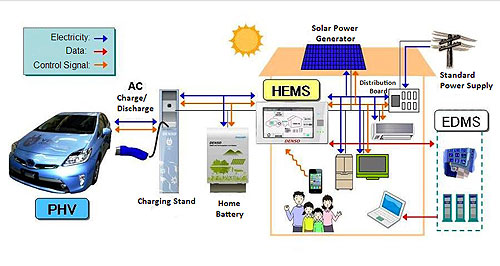Make / Model Search
News - General News - Electric VehiclesNissan, Toyota using EVs to power homesMidnight sun: Nissan and Toyota have released details of systems that use electric-vehicle batteries to store solar or off-peak electricity. Japanese car giants Toyota and Nissan announce vehicle-to-home power-sharing kits7 Jun 2012 NISSAN is about to launch a system in Japan that will enable households to draw electricity from the battery of their Leaf EV, while Toyota will begin testing a similar system for its plug-in Prius by the end of this year. Both systems can be used to store excess solar energy collected during daylight hours in the car’s battery for use at night, or store off-peak energy generated at night for use during the day. The technology also means a vehicle can provide an uninterrupted power supply to the home during blackouts or in an emergency. Toyota claims a Prius plug-in hybrid with a charged battery and full tank of fuel can provide enough electricity to supply an average Japanese household for up to four days, while Nissan’s Leaf is said to provide enough energy for two days from a full charge of its 24kWh battery. Nissan’s solution was developed in conjunction with Japanese electronics firm Nichicon Corporation and comprises a unit capable of fully charging the Leaf in four hours or transferring power from its battery back into the home. From mid-June, the system will be available at around ¥330,000 ($A4170) including tax and installation, and Nissan plans to sell 10,000 units in the first fiscal year. Toyota’s system, which is yet to be commercialised, comprises a plug-in Prius with an onboard inverter that converts stored power to 100 volts AC, connected to the home via a home energy management system (HEMS). To control the usage of electricity at times of peak demand, Toyota is also testing a kind of smart grid system that enables each HEMS to synchronise with regional energy data management systems to form a smart grid system. This will help to balance demand for electricity generation across peak and off-peak times in response to recent power shortages in Japan. Existing energy usage optimisation systems that use household batteries will be expanded to use V2H systems. Participating households will be part of the Toyota City project established in April 2010 and designed to promote a low carbon emission lifestyle, with points awarded to those who adopt energy conserving habits. Toyota was inspired by stories that emerged following the Japanese earthquake and tsunami about people using the in-built AC power outlet of their hybrid Estima people-movers (named Tarago in Australia) to power appliances amid disruption to the power grid. American EV specialist Tesla has an offer for customers who pre-purchase replacement batteries for their vehicles that involves the old battery being installed at their house and being used to store solar energy for later use. Tesla Motors Australia national sales and marketing manager Jay McCormack told GoAuto that, after the seven-year/160,000km design life of a Tesla Roadster battery, about 70 per cent of its charge capacity is retained, sufficient to power an average household for about two days.  Read more |
Click to shareGeneral News articlesResearch General News Motor industry news |












Facebook Twitter Instagram